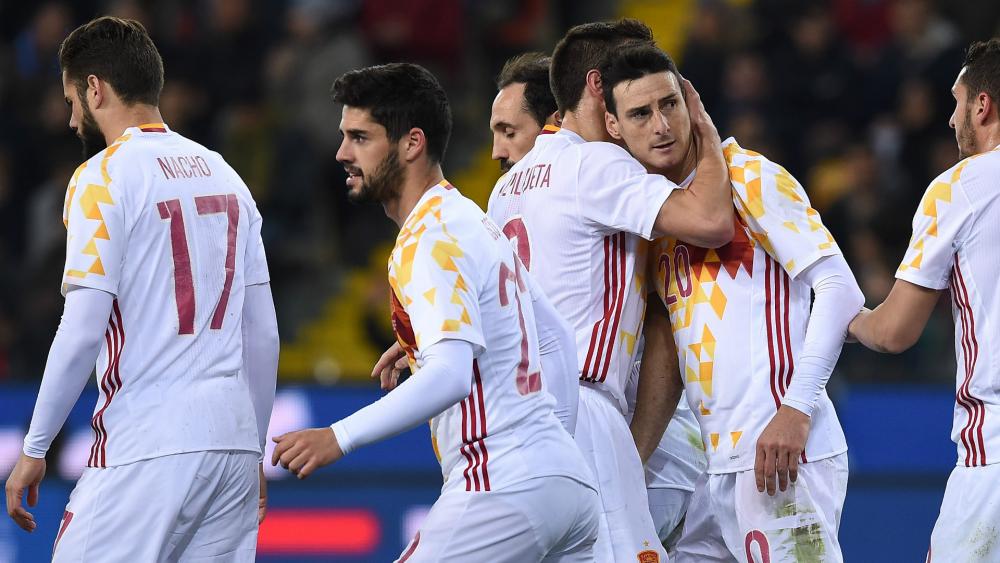Del Bosque faces critical choices against Romania - the team that changed everything for Spain
Ten years ago, Spain lost to Romania in a match which kick-started their 'golden age' - but the European champions face problems again.

The best features, fun and footballing quizzes, straight to your inbox every week.
You are now subscribed
Your newsletter sign-up was successful
Want to add more newsletters?

Five times a week
FourFourTwo Daily
Fantastic football content straight to your inbox! From the latest transfer news, quizzes, videos, features and interviews with the biggest names in the game, plus lots more.

Once a week
...And it’s LIVE!
Sign up to our FREE live football newsletter, tracking all of the biggest games available to watch on the device of your choice. Never miss a kick-off!
Join the club
Get full access to premium articles, exclusive features and a growing list of member rewards.
Spain's modern-day international supremacy has twice hit a crisis point. One appeared less than two years ago, as the shame-faced world champions were left battered and bruised in Brazil. The other? An almost-forgotten friendly defeat to Romania that changed their fortunes forever.
On November 15, 2006, Spain lined up in Cadiz amid huge uncertainty over their international future. Just months after they were well beaten by France at the World Cup, back-to-back defeats to Northern Ireland and Sweden left them facing a battle to reach Euro 2008. Romania had lost once in a year.
Whistles from the fans had begun to grow in volume long before Ciprian Marica scored the only goal of the game. A team featuring Iker Casillas, Sergio Ramos, Cesc Fabregas, Xabi Alonso and David Silva was booed off the pitch. The calls for Luis Aragones to depart were loud and long.
Far from seeing his plans turn to ashes, Aragones inspired a revolution. The man who brought unprecedented success to Atletico Madrid refused to abandon his principles and began to mould a squad that would adhere to his vision of lightning-fast possession football. Tiki-taka's rebirth had found its footing.
Spain did not lose again until they were shocked by United States at the 2009 Confederations Cup - a run of 35 games without defeat, during which they swept to Euro 2008 glory in Switzerland and Austria. Romania became known as 'the defeat before the golden age'; the big bang of Aragones' grand design.
"Luis was fundamental in the history of La Roja," surmised midfield great Xavi. "Without him, nothing would've been the same. With Luis, the revolution started, we changed our style and played more with the ball and we showed the world that you can win by playing good football."
Vicente del Bosque took charge in 2008 but quickly understood that Aragones' formula was sacrosanct; sharpening was what was needed. The World Cup in 2010 and the defence of their European title followed, including a 4-0 final win over Italy described by the boss as "the best match in my time".
The best features, fun and footballing quizzes, straight to your inbox every week.
But as Spain go in search of an historic third triumph on the continent, doubts which plagued Del Bosque after their meek World Cup defence are once again seeping into his mind. Qualification was far from faultless - a defeat to Slovakia still rankles. With the old guard retired or largely the wrong side of 30, the need to fine-tune his winning machine in these friendlies is growing paramount.
As teams have begun to tweak their own anti-Spain blueprint, the coach has taken steps. His team scorned the idea of relying on strikers to win games four years ago; against Italy this week, Del Bosque started with two.
"We had to find another way to attack against Italy," said Fabregas. "These type of games demand a lot of you as they need more tactical training.
"In the last two games, the manager has played with two strikers. I think the he's looking for alternatives for when games are tight. We have to be prepared for everyone, because other teams can play like Italy, so we have to strive to be as complete as possible."
Who those strikers will be in France remains to be seen. Aritz Aduriz's return was greeted with much fanfare and he took his chance to shine against Italy, but relying on a 35-year-old to lead the line represents an obvious risk.
Alvaro Morata also started against Italy - albeit in a wider role - but question marks over his and Paco Alcacer's ability on the biggest stage persist. The same can be said for the injured Diego Costa, who has looked at odds with Spain's style ever since he chose to pull on the shirt over that of his native Brazil.
The problems run right through the side. Sergio Busquets, Andres Iniesta and Ramos will all sit out the Romania match on Sunday, and fitness worries will likely persist between now and June. Casillas may no longer merit a starting spot but neither David de Gea nor Sergio Rico, who is expected to start in Cluj, carry the same gravitas within the camp.
Del Bosque faces some tough choices, not just in selecting a side to beat Romania, but in assembling a total set-up capable of making history in France. But if it helps to solve a few riddles, Spain will be glad to look back on another wholly forgettable match.
 Join The Club
Join The Club










